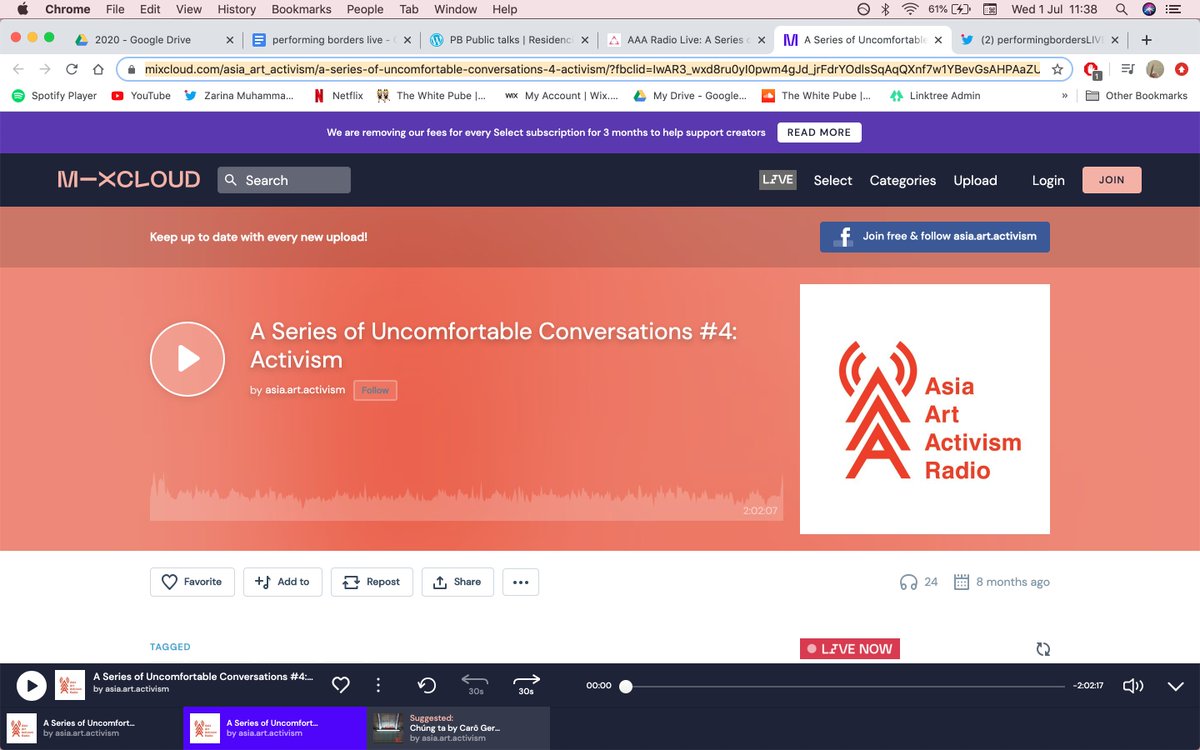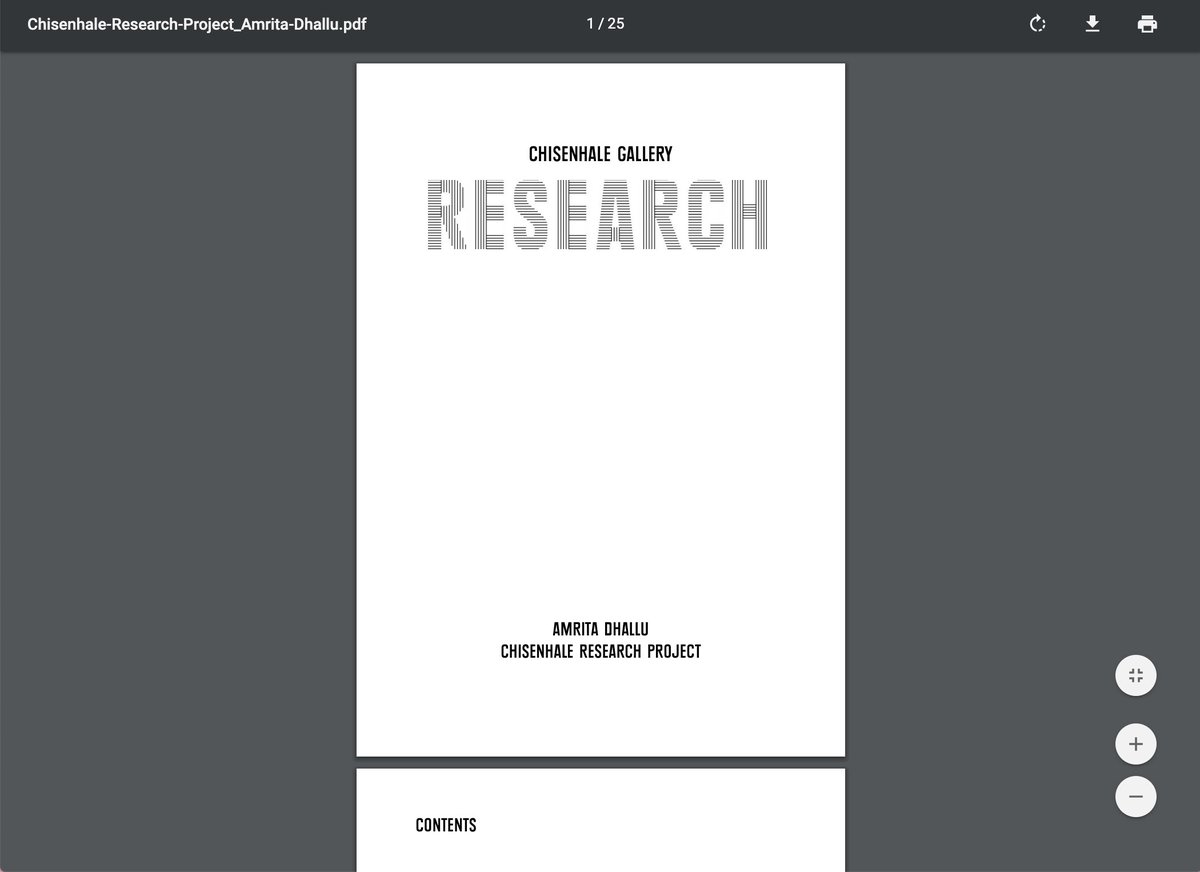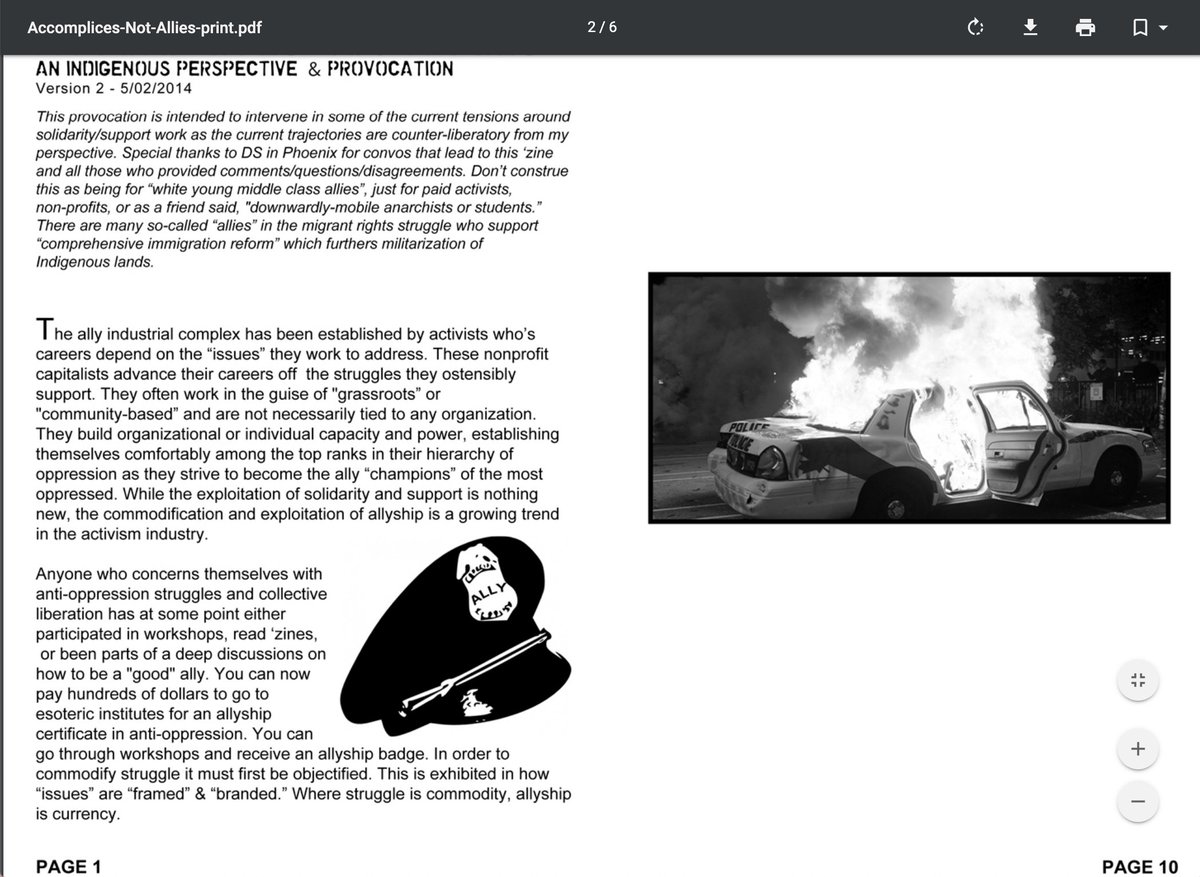ookie sO, today maybe this is a nice place to start? super relevant rn imo
AAA Radio Live: A Series of Uncomfortable Conversations #4 - a public talk broadcast by Asia Art Activism in collaboration with Performing Borders. the link from the event's here: http://asia-art-activism.net/2019/09/10/aaa-radio-live-a-series-of-uncomfortable-conversations-4/
AAA Radio Live: A Series of Uncomfortable Conversations #4 - a public talk broadcast by Asia Art Activism in collaboration with Performing Borders. the link from the event's here: http://asia-art-activism.net/2019/09/10/aaa-radio-live-a-series-of-uncomfortable-conversations-4/
you can listen back to the session here: https://www.mixcloud.com/asia_art_activism/a-series-of-uncomfortable-conversations-4-activism/?fbclid=IwAR3_wxd8ru0yI0pwm4gJd_jrFdrYOdlsSqAqQXnf7w1YBevGsAHPAaZUpB4
and check back in to this account @ 8pm(ish) and i'll be tweeting some ~thoughts feelings and relevant bits o' discourse~ to expand and dig into it!
and check back in to this account @ 8pm(ish) and i'll be tweeting some ~thoughts feelings and relevant bits o' discourse~ to expand and dig into it!
also dw if you don't have time to listen (it's 2 hours and it's a wednesday dwdw igetit) - i will make sure to tweet quotes/context to make sure we're all on the same page :)
ok ngl i am still only three-quarters of my way thru the audio - WHY DOES MIXCLOUD NOT LET U REWIND!!!?? so annoyin - but leme j tweet the lil thoughts i've got and then i can j add the rest of it LIVE (exciting)
hello! btw this is ZM :) j so you know who's doing the chatting :)))))))
ok so, the broadcast starts with a breathing exercise; honestly love that. we should all do a breathing exercise now - j like FULLY EXHALE, relax ur twitter fingers, be present OOOO mindful OOOOOOOOO
It's a broadcast of a recording from an event, our panellists here are: @ceciliawee @AleCianetti @alikati & Cuong Pham (whos twitter @ i can't find - sorry!) and they're chatting about 'the challenges of marrying the aims and contexts of artistic practice with activist agendas'
to the juice! it starts off defining the (at times tense) border and separation between political art & political activism, this thing that’s emerged in that space in between: cultural activism
I think this is rly relevant rn, as the art world struggles to reckon with being held to account by people who clearly want these institutions to assume a role that’s kinda lowkey activist-ish... pseudo-activist... externally labelled activist?
My first Q is: why are institutions/ppl that Do Political Things n engage with political concerns considered Activist-y? Does that feel like flattening, like there's a mislabelling there? Or does the art world j categorise/hold activism in a corny way? we'll come back 2 that bUt
someone mentions that cultural workers have a kind of elite job, an elite position. They're within the machinery of something that typically is designed to serve the bourgeoisie and their interests, so there’s that proximity to them & that power. I THINK THAT'S SO RELEVANT RN!!!
LOWKEY THE PROBLEM (imho) WITH THE ARTS! it's so close to bourgeoise interests and the production of bourgeoise power. i wrote about/around this a few weeks ago, n made a soft case for divesting labour from these institutions n those interests https://www.thewhitepube.co.uk/riots
then there's some other bits, someone says something about how activism is j different forms of organising. Lowkey, isn’t curation j different forms of organising too? There’s a potential commonality we see there - I rly agree w this! n that's a rly interesting point imo
it reminds me of a wider convo that had a moment a few years ago, about curatorial care? I think that as a thing was widely untapped in terms of its transformative potential for the way we ~do things~ in the art world, it ended up j peaking at being public program fodder n like
CO-OPTED by the very institution it sought to transform. BUT i still think some really good thinking came out of it. Something i think i cite a lot alongside/as supplement to texts is this one research paper from @amrita_dhallu that speaks to that convo
https://chisenhale.org.uk/wp-content/uploads/Chisenhale-Research-Project_Amrita-Dhallu.pdf
https://chisenhale.org.uk/wp-content/uploads/Chisenhale-Research-Project_Amrita-Dhallu.pdf
Rly I am q interested in this thing of the ~activist curator~ & what that has the potential to do/say; bc like… isn’t all curation the potential for action/activism? It’s j about who you centre & serve, right?
It’s interesting that curatorial practices that centre & serve marginalised ppl are siloed away from mainstream definitions of curation! that's something that's picked back up later on in the broadcast too
Cecilia calls this all ‘artivism’, a term that speaks to the ways these different functions and purposes are blurred and subsumed into each other, the complicated position of ~Artivism~ and the way it sits uncomfortably in the canon of both political history & art history
Back to the elite position of art workers as proximate to the bourgeoisie: art is still such a distant and separated, abstract, lofty field of study and understanding! Between hierarchies and practice and all these points, is there a point of leverage that comes with all that?
i mean in some way, it's a bit of a sticky one stillll bc (as someone points out) there's this continual question of ‘but is it good art?’ That haunts activist art - perhaps forcing it to dull its own potential as a tool of transformation/revolutionary potential
in another way, the question: how can that proximity to power be deployed towards activist aims? is a serious one that we should all rly spend some time considering rn; as we discuss complicity n silence and the points around that.x
rly, for me, and for others on the panel, it boils down to this Q: Is art ever capable of holding onto a radicality or is it a field that congeals in a stodgy centre, is it doomed to always j co-opt radical ideas from the margins and make them pallatable to the mainstream!?
me, myself, personally, idk. I am not rly sure about that either way - I think so much of the answer to that depends on ppl’s intention individually and the acc position of the artist/author (if it’s even a singular author in the first place!) structurally. i think it's ~nuanced~
then someone raises the question about privilege within that, which (i'm ngl) is VERY 2019. but privilege (as cultural workers, along the lines of identity, communities) is that counteracted by allyship?
it's deffo worth doing the work of introspecting the disparity in different marginalised positions, the extents and intersection (i never know if i'm using that word right u kno). can't undermine that, that'll never be dated i know i'm being flippant like skdfjg
But Ally is also a position that people with privilege <want to> inhabit! it's a marker of virtue & awareness and it has lowkey lost value in its meaning as an active doing word: VERB
is also a position that people with privilege <want to> inhabit! it's a marker of virtue & awareness and it has lowkey lost value in its meaning as an active doing word: VERB
 is also a position that people with privilege <want to> inhabit! it's a marker of virtue & awareness and it has lowkey lost value in its meaning as an active doing word: VERB
is also a position that people with privilege <want to> inhabit! it's a marker of virtue & awareness and it has lowkey lost value in its meaning as an active doing word: VERB
Someone points this out: that the position of ally functions as a kind of objectification that needs an alternative practice of solidarity to make it more powerful or meaningful. that at times Ally doesn’t function as well or as meaningfully as solidarity
Someone else counters that Ally could be functioning as a hopeful kinda vocabulary? that it describes that boundary between u (ally & marginalised person), relationship and proximity in q a truthful way. i mean, MAYBE? but also i personally like the word ACCOMPLICE
read this tbh bc i j stole all my personal hot takes/thoughts on the importance and distinction between these 2 terms from here sdjfskdgb
http://www.indigenousaction.org/accomplices-not-allies-abolishing-the-ally-industrial-complex/
http://www.indigenousaction.org/accomplices-not-allies-abolishing-the-ally-industrial-complex/
that line of enquiry kinda dries up a bit and we return to this point about power & proximity - - - - - so like, swooping back to this from the Allyship tangent https://twitter.com/perfbordersLIVE/status/1278410049061367809?s=20
someone says something about how institutions use policy to legislate the boundaries of acceptable practice within them, as a tool of governance but also of compliance.
what this ends up doing is controlling the manoeuvres of ppl within them, so if they transgress those boundaries of acceptable practice (say, they do an Activism( and what that constitutes, there's policy & process in place to punish them and minimise the effect of transgression.
this feels complicated, but i promise it's j the way i'm paraphrasing it badly lmao - basically institutional policy/processes act as a kind of internal legislation that prop up the specific power dynamics and interests in the way you'd think they would.
so actual individual transgressions of what's professionally acceptable are manoeuvred away from having impact, and if there is impact it can be mitigated through these processes that define professional acceptability. does that make sense? am i explaining this badly? (probably)
i think tho, that's a really really interesting point bc that exact pattern n mode of operation mirrors that of the state; The way control and acceptability is enforced through policy & processes (legislation!!!!) is a tactic that mirrors the CARCERAL STATE!!!!
also, back to the tangent about allyship/accomplice-ship(?), as a structure, it makes collective action/collective resistance the only way to transcend that - it requires accomplices rather than allies, who'll put their professional reputation at risk to make change feasible
i guess it's all made purposefully difficult to even achieve incremental change, which is why i personally cannot be fucked for it. i think we should all j secede from the mainstream art world, declare our independence - the democratic people's republic of Artistan etc.
but rly for both the panel & this line of enquiry; the crux is kinda this question: what is the end goal, the concrete demand, ur activist aim? is it reform or is it the building of alternative structures. i still don't know! i still wana do both, play both sides!
Someone litrally says 'do we divest from these systems?' n points out that that's dependent on whether it's rly possible to actually exist within these systems - n that is to do w privilege and assimilability as well as things like energy, ability, willingness. so it's COMPLEX!
also, when considering that Q, maybe consider why we're considering that Q in the first place? why is that even being called into question (!!?!?!?)? Cecilia asks 'how important is it to make this binary distinction or separation between art & activism?'
answering the question panellists mention: the history of how art has developed is important here. it's a thing that insists on this continuing and embedded mutability, of never being fixed down to any one point or purpose
a work might have political potential, but the market (for example) allows room for the artist to separate and distance themselves from that revolutionary position the artwork maybe occupies.
So there’s a kinda,,, slickness and slipperiness with it that allows artists to use the aesthetics of revolution n emancipation, and that ambiguity between what's actually being sincerely deployed creates those 2 categories: art/activism
art then is able to rest in the space in between the binary its created. the problem is, centrism FUCKING SUCKS!!!!! NO ONE LIKES IT! IT LEANS TOWARDS THE RIGHT. TAKE NOTE KEIR STARMER!!!! NO ONE. LIKES. A. CENTRIST.
in that though, i think back to like the first few minutes of this broadcast, and there was some chat about the way political art is blurred in function & purpose, between causing thought or action. and activism is about achieving concrete goals, causing ACTION for SURE.
like, maybe art is kinda corny in that? maybe it follows the zeitgeist and the collective mood of it all in a v not-radical way? As i say that tho, i'm reminded of @lolaolufemi_'s book <Feminism, Interrupted - Disrupting Power> https://www.plutobooks.com/9781786805935/feminism-interrupted/
there's a chapter on art, that kinda speaks to its ability to ~transform~, its potential as a revolutionary vehicle, its potential to shape our revolutionary imagination. i did! write about it! a few! months ago! not to begin & end w a shameless self-plug https://www.thewhitepube.co.uk/ideasforanewartworld
but maybe that is a nice point for me to leave this on? a nice neat circle? art has the potential to shape the scope of our activism, lead our thought that informs our action, but it does rly need to be separated from the machinery & production of power (esp state power)
THAT'S A DIFFERENT CONVERSATION THO, THAT'S LIKE NEOLIBERALISM N ALL THAT JAZZ, THE WAY ART'S BEEN OPENED UP AS A NEW MARKET TO MONETISE COMMODIFY AND GENERATE PROFIT THRU, rather than j spend some time thinking n having fun w frendz :) or dreaming of overhaul or woteva.
i think it's all v timely! all questions we could currently be thinking about to good effect! and tbh idk how much of this is specifically of interest to u, BUT IT'S CERTAINLY OF INTEREST TO ~ M E ~ & on that note i will leave u to ur dinners, G O O D. N I G H T.

 Read on Twitter
Read on Twitter




